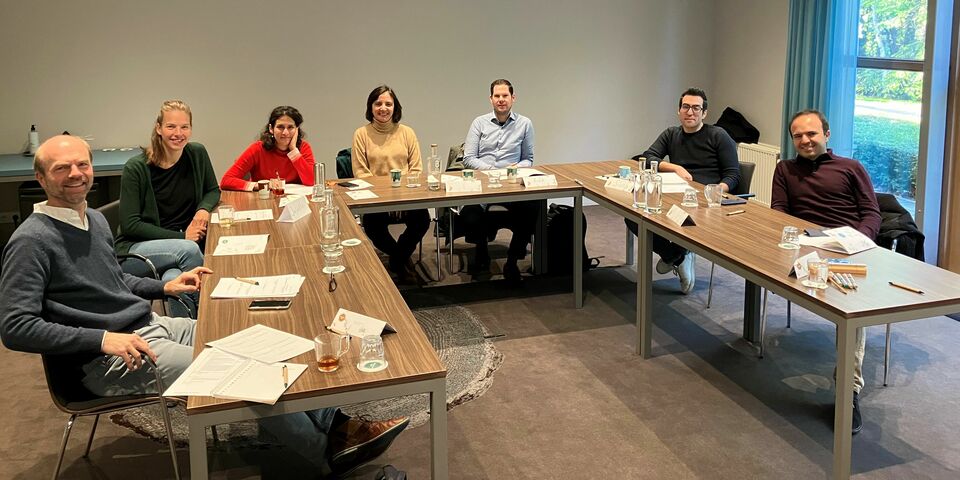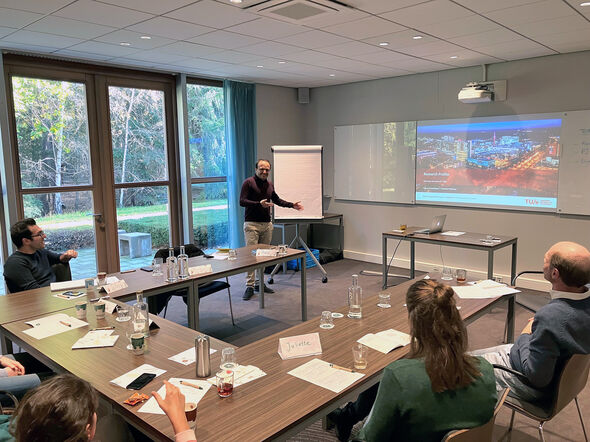Talent Program for assistant professors at Built Environment
What does your research profile look like? How do you present your research effectively, and how do you forge a suitable career path? Built Environment developed a trajectory for tenure track assistant professors in order to answer those exact questions. “And community building is a goal as well,” Twan van Hooff says. After last year’s well-received pilot edition, the second group of participants started with the Talent Program this academic year.
In times of high work pressure, it helps if researchers know what funding they would like to apply for, and in what kind of collaboration they would like to participate. It’s important to really know your research profile, because that will make it easier to make sharp decisions.
The department of Built Environment launched a special Talent Program last year in which seven tenure track assistant professors asked themselves that very question: what does their research profile look like?
“The name ‘Talent Program,’ incidentally, refers to the personal talents that the participants discover during the trajectory,” associate professor Twan van Hooff says. In other words: this is not an elite group of uniquely talented individuals. The decision to invite participants to take part in the program was based on organizational grounds, such as diversification across the units.
Group feeling
“The program has three columns: intervision meetings, workshops and mentoring,” says Van Hooff, who supervises the intervision meetings together with external trainer René Diepenveen. “That is where the participants discuss and present their research profiles, and where they receive feedback from their peers. As far as research content is concerned, this trajectory is different from a course like Academic Leadership.”
In part due to the fact that the coaches pay attention to group dynamics, the assistant professors also feel free to share matters that they wouldn’t be so keen to discuss with their supervisors under normal circumstances. “Everything remains behind closed doors, and there’s a true group feeling among participants.”
The workshops focus on a variety of topics, including open science, data management and research financing. Participants are coached by a private mentor: an associate or full professor from a different unit at Built Environment.
PI model
With the Talent Program, the Built Environment department anticipates the introduction of the PI-model. According to this system, scientists act as principal investigators and determine their own research course at the early stages of their careers. They depend less on (the professor in) their research group, for example, when it comes to applying for funding.
The Talent Program also does away with the classic formation principle, with one professor in charge of a research group. Van Hooff: “This development makes it more important for a researcher to have a unique profile. It increases your chances for growth. We ask people to reflect on their own position – within the group, but also within the department and the university as a whole.”
Evaluation
After the pilot year 2021-2022, the Talent Program was evaluated positively by the first group of assistant professors. A presentation for the Executive Board and the deans of the other departments was also met with approval. “Several departments have plans for a similar trajectory, or are already busy setting one up.”
One thing has changed this year, Van Hooff says: “We realized that participants ran a bit late sometimes, or had to leave a bit earlier because they had another appointment. A result of high work pressure. That is why we decided to cluster our meetings more, and to hold them at a location away from campus, so that everyone can literally distance themselves from work for a moment.”
Looking back
In the panels below, assistant professors Rob Wolfs and Ekaterina Petrova, both of whom took part in the first edition of the Talent Program, look back on their participation.
“A group to fall back on”
For Rob Wolfs, assistant professor in the Concrete Structures group, the Talent Program came at exactly the right moment last year. Since he was working on a Veni application, he was already asking himself the following questions: What’s my research profile? How do I present it? “My ideas about this haven’t changed because of the program, but it’s a good thing that I was able to present them to the group and ask for feedback.”
Wolfs knows from personal experience that it’s not always easy during a busy working week to find the time and space to invest in oneself. “It’s hard to turn the switch when you have an intervision meeting wedged between a meeting and a lecture. I think it’s good that they’ve adapted the planning to that now.”
The meetings with his mentor were very productive, Wolfs says. “I have the feeling that much thought was put into the matching. My coach has a different profile than my supervisor when you look at their career paths, and that brings a different, inspiring input.”
But what pleases him most are his fellow participants. “It’s really nice to share frustrations and to celebrate accomplishments. It has become a group to fall back on.”
“Outside perspective brings clarity”
The timing also worked out well for assistant professor Ekaterina Petrova (Artificial Intelligence in Construction): “I left Denmark for Eindhoven in the middle of the Covid-19 pandemic for my appointment here. The Talent Program allowed me to start building a network at TU/e. And this group is of great value.”
The trajectory also made it clear to Petrova what the implementation of the PI-model means to her. “I had difficulty imagining in concrete terms how this system might change Academia and what it means to me. The Talent Program gave me a framework for that. I also have a clear picture now of the criteria for the upcoming midterm tenure assessment.”
Petrova already had a clear vision of her research direction, but nevertheless considered the act of presenting her research an instructive experience. “During conferences, you present your research to peers from the exact same field. In the Talent Program, that’s different. That outside perspective brought clarity.”
This different perspective also proved to be of added value in the mentoring trajectory. Like Wolfs, Petrova believes that the assistant professors were matched with their mentors with considerable care. “My coach was precisely external enough to discuss sensitive topics with, but at the same time, sufficiently informed to provide me with advice based on experience.”



Discussion